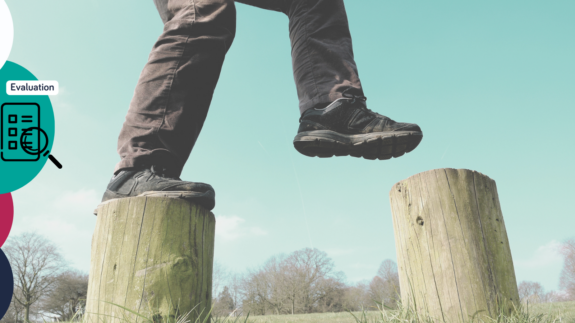01 Dec 2023
An evaluation of Forward’s Stepping Stones programme (a CBT-based group intervention to develop recovery skills) shows positive outcomes for participants’ resilience, self-efficacy, and general mental health.

Stepping Stones is a psychosocial intervention developed by Forward to support people using drugs or alcohol at harmful or dependent levels. First launched in 2012, the programme originally featured 20 sessions, designed to be delivered to groups of individuals in prison settings across 4 weeks. Stepping Stones uses Cognitive Behavioural Therapy (CBT)-based techniques specifically targeting areas identified as key skills for recovery:
The programme is intended to prepare participants for more intensive treatment - categorised as an ‘Engage’ intervention within our integrated models of support, illustrated below, building skills and confidence to help people get started on their journey to recovery.
Stepping Stones re-launch 2021
As part of our commitment to continual service improvement, we undertook a comprehensive needs assessment of our substance misuse treatment offering in prison settings. This included analysis of current intervention efficacy and interviews and focus groups with our practitioners and service users. We identified an opportunity to reach more individuals by enhancing the flexibility of our Stepping Stones programme to reflect different regimes and lengths of sentence.
An updated Stepping Stones was co-produced and re-launched in 2021. It comprised 12 core sessions and 12 optional or additional sessions. New sessions were also developed, based on feedback:
This new programme was internally evaluated in 2022 by the Research Team. Data from 194 Stepping Stones participants in 7 prison settings over the period September 2021-August 2022 were analysed to understand the efficacy of the new programme.
The majority of participants were Male (84%) with the Female participants (16%) reflecting our services in HMPs Downview and Send. Participants were majority white (71%); 146 (75%) of the cohort fell between the ages of 30-49. The cohort was considered reflective of the national treatment population, with the exception of our population having more diversity in ethnicity.
The majority of our service users fall into high drug-dependence (73%) and possible alcohol dependence (40%) categories on both the Substance Dependence Scale (SDS) and Alcohol Use Disorders Identification Test (AUDIT). The high number of individuals showing low risk alcohol use disorder scores (45%) often had alcohol as a secondary substance.
The evaluation looked at completion rates and pre and post treatment psychometric scores for resilience, self-efficacy, and mental health (depression and anxiety). Where possible the results of the pre and post scores were assessed for their statistical significance (likelihood that the results are not due to chance). The mental health outcomes were later chosen for comparison against NHS mental health intervention outcomes, which dictates whether interventions which are developed to specifically target depression and anxiety are proven as effective in doing so.
Completion rates
Resilience
Self-efficacy
Mental health
Mental health (further analysis)
Conclusion
The results of our evaluation show that the re-launched version of Stepping Stones has successfully reached a wider audience and achieved higher completion rates than the original version. The programme continues to build individuals’ resilience and confidence to assert themselves when faced with drug and alcohol taking situations and progress towards the next phase of their recovery. The secondary benefit identified of significantly improving mental health symptomology will continue to be monitored for its consistency and whether it aids in relieving pressure on secondary mental health services.
References
[1] HMPs Brixton, Coldingley, Downview, High Down, Send, Stoke Heath, The Mount